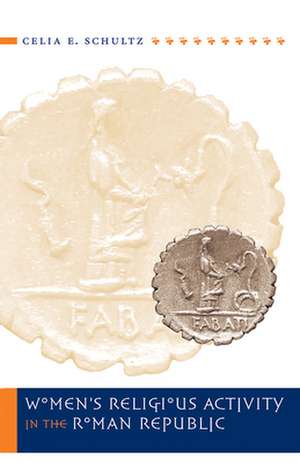Women's Religious Activity in the Roman Republic: Studies in the History of Greece and Rome
Autor Celia E. Schultzen Limba Engleză Paperback – noi 2021
Based on research in ancient literature, inscriptions, and archaeological remains from the fifth to the first century B.C.E., Schultz's study shows that women honored gods unaffiliated with domestic matters, including Hercules and Jupiter; they took part in commercial, military, and political rites; they often worshipped alongside men; and they were not confined to the private sphere, the traditional domain of women. The Vestal Virgins did not stand alone but were instead the most prominent members of a group of women who held high-profile religious positions: priestesses of Ceres, Liber, and Venus; the flaminica Dialis and the regina sacrorum; other cult officials; and aristocratic matrons who often took leading roles in religious observances even though they were not priestesses. Schultz argues that women were vital participants--both professional and nonprofessional--in the religion of the Roman Republic and that social and marital status, in addition to gender, were important factors in determining their opportunities for religious participation in the public sphere.
Preț: 232.48 lei
Nou
Puncte Express: 349
Preț estimativ în valută:
44.49€ • 45.96$ • 37.03£
44.49€ • 45.96$ • 37.03£
Carte tipărită la comandă
Livrare economică 26 martie-09 aprilie
Preluare comenzi: 021 569.72.76
Specificații
ISBN-13: 9781469668802
ISBN-10: 1469668807
Pagini: 250
Dimensiuni: 140 x 216 x 15 mm
Greutate: 0.32 kg
Editura: The University of North Carolina Press
Seria Studies in the History of Greece and Rome
ISBN-10: 1469668807
Pagini: 250
Dimensiuni: 140 x 216 x 15 mm
Greutate: 0.32 kg
Editura: The University of North Carolina Press
Seria Studies in the History of Greece and Rome
Notă biografică
Celia E. Schultz is assistant professor of classics at Yale University.
Descriere
Expanding the discussion of religious participation of women in ancient Rome, Celia Schultz demonstrates that in addition to observances of marriage, fertility, and childbirth, there were more - and more important - religious opportunities available to Roman women than are commonly considered.














